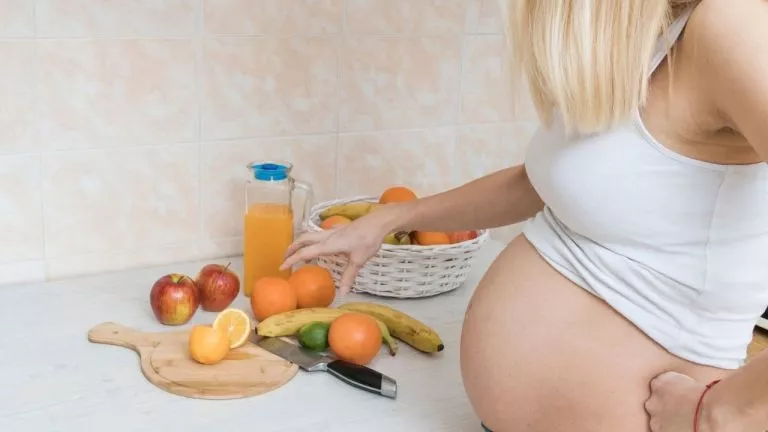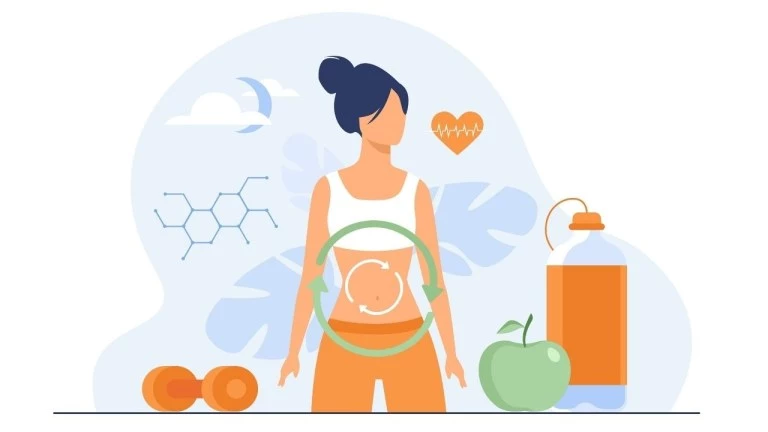9 Best Fruits to Eat During Pregnancy in 2022
Many Nutritionists use the phrase “Eat the Rainbow”. What does it mean? It means to incorporate more fruits and vegetables of different colors into your diet. In pregnancy, eating a healthful and varied diet is important because the nutrients requirements are increased.
The Research, a cohort study done by Professor Piush Mandhane which is published in the Journal EbioMedicine, has found that the children with mothers who ate more fruits during pregnancy performed better on development testing at one year of age.
The right intake of vitamins and minerals is helpful for fetus development and growth as well as it ensures the long-term health of the mother and the baby. This article explores the 9 Best Fruits to Eat During Pregnancy etc.
Benefits of Fruits during pregnancy

- To provide vital nutrients:
Fruits are loaded with vitamins, minerals, antioxidants, phytochemicals, and fiber, etc., and play an important role in a healthy pregnancy.
Vitamin C is useful to build collagen and connective tissue. It is essential for strong immunity.
Calcium is useful for the development of bones and teeth in babies.
Folate is useful for the formation of red blood cells and reduces neural tube defects, anencephaly in babies.
Iron is important to increases hemoglobin levels.
Potassium is for maintaining blood pressure.
Dietary fiber reduces cholesterol levels, lessens the risk of heart disabilities.
Antioxidants in fruits boost immunity and blood circulation throughout the body.
- To satisfy your cravings:
Common pregnancy flavor cravings are – Sweet and Sour. Fruits are extremely sour or sweet, so it is a healthy choice for pregnancy carvings. A slice of ripe mango instead of mango ice cream is always a delicious and nutritious choice for pregnancy carvings.
- It keeps you hydrated:
Fruits are composed of more than 80% of water, it keeps your body hydrated. Plenty of water is required during pregnancy, if you feel bore to sip the water all day, then you can have juicy fruits to hydrate yourself.
- To relieve constipation:
Constipation is a common complaint in pregnancy. Slow digestion in pregnancy and iron supplements are the main causes of constipation. Fiber and water in fruits improve digestion and relieve constipation.
- Fruits are useful to deter morning sickness.
- Energy Booster:
Fruits also act as an energy booster in pregnancy fatigue. Women with gestational diabetes can also eat fruits in moderate amounts. Fruits like apples contain boron, a mineral that helps to boost energy, plus it contains fiber which prevents a spike in blood sugar.
Best Fruits to Eat during Pregnancy
Guava
Guava is an ideal fruit for pregnant women. It is rich in iron, prevents iron deficiency anemia which is a common cause of anemia in pregnant women. It is loaded with vitamin B along with vitamin C and E which helps to improve the immune system.
Laxative properties in guavas help to regulate your digestion, by both solidifying and softening the stool. This eases the symptoms of both diarrhea and constipation. It is rich in antioxidants which help get rid of toxins in the body. Vitamin C content in guava reduces morning sickness in pregnant women.

Along with vitamins, this fruit is also loaded with minerals such as copper, magnesium, calcium, and phosphorus, etc. which are helpful for fetus development.
Orange
The sweet, tangy, and juicy fruit is the right choice for pregnancy carving as well as it provides some respite from morning sickness. It is a great source of folic acid which is useful for the development of a baby’s brain and prevents neural tube defects.
Vitamin C strengthens the immune system of the woman and the baby. The potassium content in oranges regulates blood pressure and provides relief from hypertension. Sodium and potassium maintain the fluid level in the body and water content keeps your body hydrated.
Apple
An apple a day that keeps the doctor away is not just a tale. It is good in vitamin C which keeps your immune system strong. It is also high in fiber which regulates digestion and prevents constipation and hemorrhoids in pregnant women.
As you have seen in benefits, apples are the natural energy booster and pregnant women need them because growing a baby so exhausting process. It is high in iron which prevents anemia. Flavonoids and phytochemicals act as antioxidants and combat free radicles from the body. The phytochemical compounds in this fruit act as anti-cancer and reduces the risk of lung, digestive tract, and breast cancer.
Daily consumption of apples reduces bad cholesterol and keeps your heart healthy. There is a reduced risk of wheezing, asthma, and eczema in children in the later stages of life. It detoxifies the body from mercury and lead.
Berries
All berries such as strawberries, raspberries, blueberries, blackberries, etc. are rich in vitamin C, vitamin E, calcium, iron, carbohydrate, fiber, folate, and phytonutrients like flavonoids and anthocyanins.
It boosts the immune system. Also, act as an anti-inflammatory. Minerals such as calcium, magnesium in the berries ensure appropriate growth and development of bones of the fetus.
Bananas
You can get it easily in the market throughout the year. Bananas are a rich source of potassium. Potassium regulates the fluid and blood pressure in the body and prevents leg cramps or pain during the later stages of the pregnancy.
The dietary fiber in bananas along with potassium promotes digestion and prevents constipation. Having a banana after every meal is good for bowel movements. It acts as an instant energy source because of glucose, fructose present in it. It also acts as a natural stress buster; it reduces your stress and anxiety which is common in pregnancy.
Pomegranate
The red, juicy little pearls of pomegranate are the powerhouse of the nutrients. It can provide you plenty of nutrients such as vitamin K, calcium, folate, iron, protein, fiber, energy, and other nutrients.
Vitamin C, iron prevents iron deficiency anemia. It has a good amount of fiber which stimulates bowel movements. Antioxidants present in it reduces free radicles formed in the body, repairs the cells, and protect the baby’s brain from any damage. Potassium in pomegranate provides instant relief from pregnancy-related cramps. You can eat pomegranate pearls or drink juice.
Avocado
Avocado is a rich creamy fruit with huge nutritional qualities. It is an excellent source of vitamin C, E, and K, monosaturated fatty acids, fiber, potassium, copper, and folate, etc. Folate and potassium are important for fetal growth and development. An abundant amount of iron prevents anemia.
Fiber is helpful for digestion and bowel movements. Potassium along with calcium is helpful to prevent leg cramps during pregnancy as well as potassium reduces the risk of pre-eclampsia by regulating blood pressure.
Choline present in avocado is necessary for fetal brain and nerve development. It contains healthy fat which provides energy, as well as omega3 and omega 6 fatty acids are beneficial for the mother and baby. Lutein and zeaxanthin, the antioxidants in avocado are good for vision.

Mangoes
Mango, the king of fruits, is nutritionally rich with unique flavor and taste. It is rich in vitamin C and A. Vitamin C is useful for immunity building, tissue repairing and it also lowers the risk of preterm labor.
Vitamin A promotes the functional development of the fetus and also nourishes the eyes and nervous system. The sweet and sour taste of mangoes and vitamin B6 manages morning sickness. It is high in calories and pregnant women can have it in the third trimester when energy requirement increases.
Watermelon
Watermelon is a good source of vitamin A, vitamin C, and Vitamin B6, potassium, calcium and magnesium, etc.
Magnesium is useful to relax the muscles, which can prevent premature contraction during pregnancy. It is useful to overcome morning sickness, reduces heartburn, and prevent dehydration.
Many pregnant women are having to swell on their hands and feet, also known as edema. It occurs due to an unusual accumulation of fluids in certain tissues in the body. High water content in watermelon is helpful to open the blockages and provide relief from edema. It has diuretic properties that flush out toxins and reduces uric acid in the body. You found calcium and potassium in good amounts, which are necessary for bone development in the fetus.
Other than these fruits many local and seasonal fresh fruits like Lemons, Cantaloupe, Pears, Custard apple, Sapota, Kiwi, etc. you can add to your plate.
Dried Fruits and nuts
Dried fruits are the fruits from which water content has been removed by sun-drying or using artificial dryers or dehydrators. The fiber and other nutrients are preserved during this process and it becomes the concentrated source of nutrients and energy. Raisins, Prunes, Dates, Figs, Peaches, Apples are some examples of dried fruits, and cashew, almond, walnut, pistachio, etc. are the nuts.
Dried fruits are rich sources of fiber, iron, and protein. Nuts are high in fats and calories. Therefore, pregnant women get their RDA of vitamins and minerals by eating a small portion of it. A handful of dried fruits and nuts a day is enough.
Hormonal changes in pregnancy lead to constipation, and high fiber content in dried fruits prevents constipation. Dried fruits such as dried apples are rich in potassium which controls blood pressure. High iron content maintains hemoglobin level and prevents iron deficiency anemia.
How Much Quantity of Fruits Should I Eat During Pregnancy?
The general recommendation for pregnant women is 2-4 servings of fruits per day. And one serving of fruits equals to
1 medium whole fruit (about the size of a tennis ball), for fruits larger than the size of a tennis ball, 1 cup of cut fresh fruits, canned or frozen fruits
8 ounces of fruit juice
A woman with gestational diabetes should limit fruit intake in moderate amounts or small portions size. Consult with a doctor or dietitian and fix the serving sizes of fruits.
Safety Tips
- Go for organic fruits.
- Wash the fruits thoroughly with potable water.
- Remove bruised areas where bacteria may lurk.
- Avoid eating precut fruits or cut them just before you eat.
- Drink only pasteurized or boiled fruit juice.
Delicious and healthy ways to add fruits to your diet:
- You can add pieces of fruits and nuts to breakfast cereals.
- Take mixed fruits cubes, sprinkle some chili powder, black salt, squeeze few drops of lemon and your fruit chat is ready.
- Prepare varieties of smoothies by blending fruits, yogurt, and fruit juices.
- Add bananas, dry nuts in different porridges.
- Take diced mixed fruits and add some yogurt or thick curd and slight sugar or honey for taste and your fruit salad is ready.
Conclusion
Fruits come under protective food group because abundant vitamins and minerals present in the food keep us healthy and protect us from diseases. Eating fruits during pregnancy helps in keeping the baby and mother healthy.
Read More:
FAQ:
Q. Which fruits should avoid during pregnancy?
A. Unripe Papaya: It contains latex, which causes premature contractions to occur.
Q. Can pregnant women drink fruit juices?
A. Yes, but only pasteurized or boiled fruit juices are allowed for pregnant women. Also, avoid sugary juices. Whole fruit contains fiber so it is a better choice than fruit juices.
References:
- https://www.ncbi.nlm.nih.gov/pmc/articles/PMC3183591/
- https://thorax.bmj.com/content/62/9/773
- https://www.ucsfhealth.org/education/eating%20right%20before%20and%20during%20pregnancy
- https://www.myplate.gov/eat-healthy/fruits






